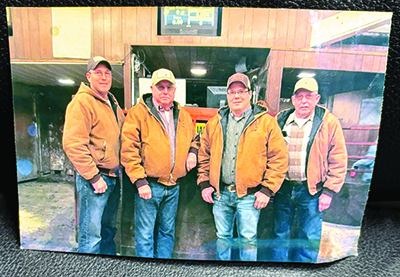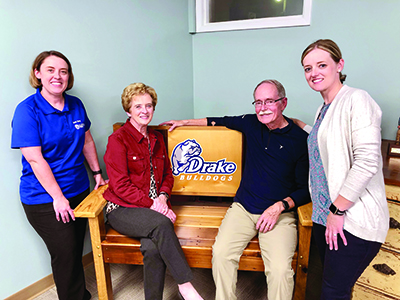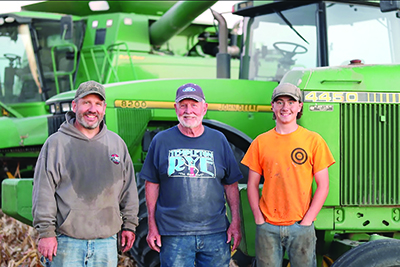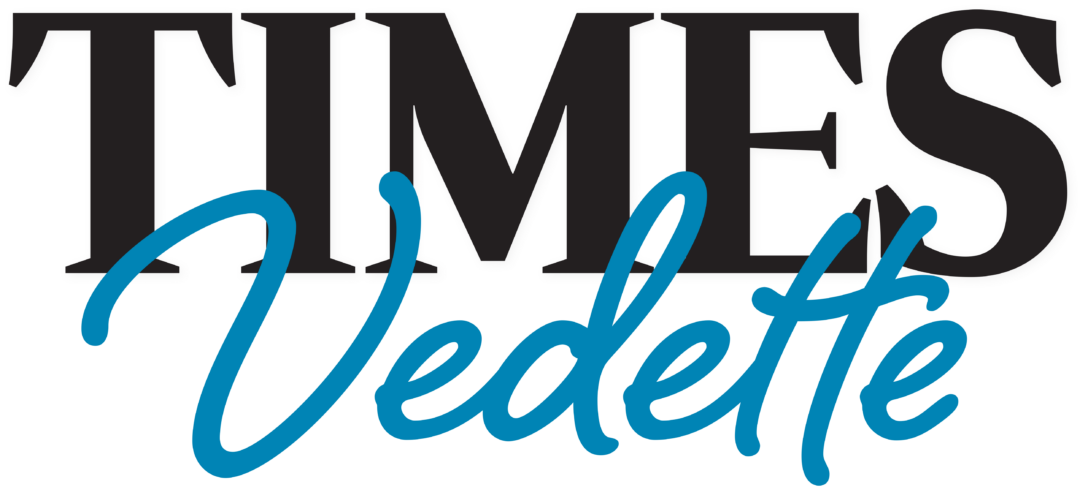Family businesses pass on to the next generation.
By Rich Wicks | Guthrie Center Times
“If you are going to leave footprints in the sands of time, you’d better wear work shoes.” — Le Grand Richards, missionary (1886-1983)
Family roots run deep in Guthrie County. Because of this, many families have younger generations who have followed in the family business. Here are a few of their stories.

Terry, Jim, Dan and the late Larry Laughery of Guthrie Livestock Auction.
Laughery family
(Guthrie Livestock Auction)
Most anyone involved in agriculture around Guthrie County is well aware that the Laugherys know livestock. Since 1951, the family has owned and operated Guthrie Livestock Auction at 407 S. Third St. in Guthrie Center, selling livestock for area farmers. Several members of the family (Jim, Terry and Dan) recently offered their perspectives on the family business, which is one of the oldest in Guthrie County.
“The barn started in 1928 as a livery stable. There were 75 shareholders,” Jim said.
Then, in 1951, the building and business were sold at auction. Lloyd Laughery (Jim’s father) bought it and went into partnership with his brother, Gerald. While running the business, Lloyd and his wife, Ila, raised sons Jim and Larry, who followed in their dad’s footsteps by making their living at the business.
Larry passed away in January of 2024, but his son, Dan, has followed in the family tradition, as has Jim’s son, Terry. Terry, Dan and Jim joked that, in their family, kids start helping out in the family business almost from birth. Jim recalled that, at age 14, he was already going to area farms, buying cattle for the next auction. He also remembers being initiated into auctioneering at a young age.
“My dad just pushed me up there and said, ‘Go to it,’ ” Jim said.
Nowadays, there is a two-week training to become an auctioneer, but the bulk of the learning still happens on the job. Terry shared a favorite saying about auctioneering.
“You put a whole bunch of marbles in your mouth, and you try selling, and you spit a marble out. And once you’re lost all your marbles, you become an auctioneer,” Terry said.
The three Laughery men said working alongside family has meant a lot to them.
“It has kept everybody living locally. The majority of our kids are around here, and they’ve helped out throughout their lives,” Terry said.
The business has seen significant changes over the decades, mostly in the areas of technology and the decrease in the number of local livestock sellers. Jim recalled that, many years ago, it was common practice for a farming couple to come into town on the day of an auction, with husbands selling or buying livestock while wives shopped downtown.
Terry explained how having fewer auction barns has impacted the business.
“Back in the day, there was almost a sale barn in every town, and they’re getting fewer and farther between,” Terry said. “That enhances our numbers of getting more cattle here, but we have to draw them from a long ways away.”
He said farmers bring livestock from as far as 100 miles.
Jim shared a memory of this difference in the industry.
“In 1966, my dad was president of the Iowa Livestock Association,” he said. “There were 166 auction houses in the state of Iowa. There’s about 36 now, and not all of them have weekly sales.”
Because of the nature of farming, the Laugherys are busiest during the winter and when weather is inclement. Dan explained the reason.
“Basically, in May, June, July and August, the farmers have their cows and calves out to pasture, so they’re not selling anything. And that’s when they’re out doing their row crops. Once they get crops out in September and October, then we start moving cattle,” he said. “A nice day is a social event, and a nasty day is ‘I’m here to buy something.’ ”
Other than the changes already mentioned, the Laughery family has kept to the business plan that’s worked for generations.
“We haven’t really changed in years. The only thing that’s changed is now we have it online and in-person,” Terry said.
All three spoke of the importance of earning and keeping the trust of the area cattle producers. They said the family name has become an important part of that.
“We’re the owners, unloading your cattle, sorting your cattle, selling your cattle, and loading them back out,” Dan said.
“We strive that you’re going to get an honest deal. That’s the whole thing in a nutshell,” said Jim.
Jim also pointed out that, although the business requires a lot of hard work, it’s worth it.
“Anybody that’s worked here hasn’t gotten rich doing it, but the fellowship has been outstanding,” Jim said. “It’s more the friendship and good times.”
Dan said everything in the agricultural market is unpredictable due to the many global and economic factors, but he’s still happy working in the family business and has no plans to make any drastic changes.
“You don’t fix something that’s not broken, I guess,” Dan said.
Terry agreed, saying he’s proud to continue the family’s legacy.
“It’s nice to have a family business, because you take a little more pride in it,” Terry said.

Julie Priestley, Janice and Jim Vandevanter, and Jane Clausen
Vandevanter family
(Dowd Drug)
Family matters. And in small towns, family perhaps means even a bit more, which is why Dowd Drug in Guthrie Center still carries the name of the family that formerly ran the business, even though they haven’t owned it for 40 years.
Julie Priestley, pharmacist and owner of Dowd Drug, explained her family’s history in the business. She and her sister, Jane Clausen, have each followed in the footsteps of their parents, Jim and Janice Vandevanter, in running small, independent pharmacies.
“My dad went to pharmacy school at Drake, and then he came back here. The Dowd family ran Dowd Drug, and he worked for the Dowd family first. Then he and my mom took over the business in the early 1980s. My mom, Janice, worked on some of the bookwork side of it, and he was the pharmacist,” Priestley said.
The Vandevanters eventually expanded, purchasing Adel Health Mart Pharmacy in 2008. Later, this allowed Priestley and Clausen to step in when their parents were ready to retire.
“In 2018, my sister, Jane, and I purchased both stores from him,” said Priestley. “My sister and I also both went to pharmacy school at Drake. We just grew up in the pharmacy world, I guess. I started working here at Dowd Drug when I graduated as a pharmacist in 2003 and have been a pharmacist ever since.”
Priestley remembers that, at a young age, she already planned to follow her father’s career path.
“There was a career day in third grade where kids could dress up as whatever they wanted to be,” Priestley said. “I remember I wore a white lab coat, as a pharmacist, and I took a bottle with some M&M’s in it. So, I guess ever since then, I realized that’s what I wanted to do.”
Working with family members can create some unique challenges, but Priestly has found the advantages outweigh any disadvantages.
“I worked alongside my dad for several years,” Priestley said. “The pros are that I could bounce things off him and gain the knowledge that he’s had of the pharmacy world.”
Over the decades the family has worked in the pharmacy field, they’ve seen many changes, but the commitment to small town service has remained.
“The technology has definitely changed over the years,” said Priestley. “I remember when I was little, they’d have the typewriters out. The billing has changed, too, and not many people had pharmacy insurance, but now it’s like everybody has it. And we have machines that help us count the pills.”
Priestley recalled a notable time when her parents were especially helpful.
“We had the incident with the fire in June of 2020. It was in the building next door, but we had complete smoke damage in the building,” Priestley said. “We had to gut everything and move it all out. This was after my dad had pretty much retired… Throughout that time, he was kind of the manager for getting everything put back together. He really helped me out a lot, because we had to move the pharmacy across the street for eight months. My parents both helped me out tremendously during that time.”

Jon, Charlie and Maxwell Owen carry on the farming tradition.
Owen family farm
Charles Owen, Sr., who was born in 1851, was responsible for starting the Owen family legacy on the farm, which is along Highway 44, just west of the “M & M Divide.” Charles and his wife, Anna, relocated from Wisconsin to Guthrie County.
“The older Charlie Owen, they came in a covered wagon. Coincidentally, this would be the 150th year, because 1874 was when they came in the wagon, from Green Lake, Wisconsin,” said Charlie, Jr.
That journey was more than 400 miles and took three weeks. The farm started out as 80 acres, but, over time, adjacent land was added. Charlie, Sr. and Anna’s son, Fred, took over the farm, and he eventually turned it over to his son, Fred, Jr. Later, Fred, Jr. passed the farm to his son, Charlie, Jr. Now Charlie and his wife, Ruth, have retired. That allowed their son, Jon, and his wife, Donna, to take over farming the land.
Even in retirement, Charlie likes to stay involved in parts of the farm work. He still runs the tractor at times.
“It’s enough that it keeps Jon busy, and it gives me something to do,” Charlie said.
Jon and Donna’s children (Parker, Anna and Maxwell) are all young adults and represent the sixth generation of the Owen family to live on the farm. So far, it’s unclear if any of the three will one day take over farming the land.
“They’re all trying to figure out what they’re going to do,” Jon said.
The Owen family reminisced about the challenges and changes that the family and the farm have experienced.
“One of the things that I think is amazing is that they were able to keep the farm through the Depression years. Charlie’s granddad was helpful in developing Farm Credit Services,” said Ruth.
Although the farm initially grew a variety of crops and livestock, that has changed over the years.
“Charlie’s great-granddad was one of the first in the area to use hybrid seed corn,” Ruth said.
“We kind of tried to stay with the times, I guess,” said Charlie. “We don’t have livestock anymore. We did have a cattle herd, but now we’re just corn and beans.”
Jon said he hadn’t necessarily planned on being a farmer. He earned a college degree in the technology field but recalls in 2008 when his dad decided it was time to move into town. That’s when Jon decided to move his family to the farm and continue in the family tradition.
After 150 years as a family farm, there are no plans to make major changes now.
“I don’t know what would be different,” Jon said. “It just kind of depends on how innovative you can get to come up with something different. What we’re doing has always worked.”
